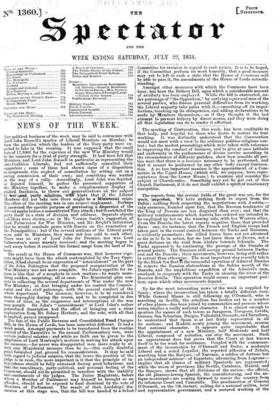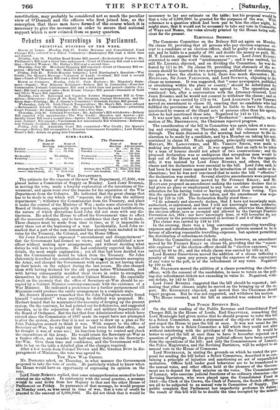By far the most interesting news 'of the week is
supplied by Spain ; where the insurrection has taken a totally different turn. While General Bloser is still following up O'Donnell, who is marching on Seville, the rebellion has broken out in a number of other places—has been joined by communities and persons whose union implies a really national character. It is almost enough to mention the names of such towns as Saragossa, Taragona, Lerida, Gerona, San Sebastian, Burgos, Valladolid, Grenada, and Barcelona, to understand that Spain is at last fairly represented in all. its sections ; and Madrid, newly joining the movement, crowns that national character. It appears quite improbable that the appointment of a new Ministry, half Moderado and half Liberal, composed of nobodies, can stay the movement. Such an appointment does but prove that the Court at last knows itself to be too weak for resistance. Coupled with the commence- ment of the insurrection hy O'Donnell and Dulce, a moderate Liberal and a noted Loyalist, the reported adhesion of Zabala, marching from the Basques—of Narvaez, a soldier of fortune but an independent sabreur—of Espartero, advancing from Logrono- implies that all classes of military Spaniards are represented; while the union of provinces like Seville, Catalonia, Madrid, and the Basques, shows that all divisions of the nation—the official, the old pleasure-loving Spanish, the manufacturing, and the an- tique-municipal—are coming forward to rescue the country from its infamous Court and Camarillo. The proclamation of General O'Donnell, on the 7th instant, calling for a national militia, local and representative government, and a restored working of the
constitution, may probably be considered not so much the peculiar view of O'Donnell and the officers who first joined him, as the conception that these men have formed of the course which it is necessary to give the movement in order to secure that national support which is now evinced from so any quarters.



























